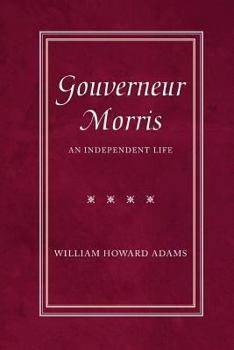Gouverneur Morris: An Independent Life
Select Format
Select Condition 
Book Overview
An engrossing biography of one of the most colorful and least well-known of the founding fathers
Format:Paperback
Language:English
ISBN:030020745X
ISBN13:9780300207453
Release Date:January 2014
Publisher:Yale University Press
Length:368 Pages
Weight:1.22 lbs.
Dimensions:0.8" x 6.1" x 9.2"
Customer Reviews
1 rating
Adams Spendidly Gives Morris his Just Due
Published by Thriftbooks.com User , 20 years ago
In his book, "Gouverneur Morris: An Independent Life," William Howard Adams splendidly brings to life one of our Republic's most important citizens, the incomparable, the iconic, Gouverneur Morris! It's fair to say that this remarkable, witty, intellectual and cynical man was "The Bronx." His family estate, Morrisania, encompassed 9,000 acres of that area in New York. It stretched from the Harlem River to the south and touched on the East River, facing Randall's Island. Morris was a New Yorker, all 6 ft. 4 inches of him. When Manhattan was young, he was young, too, graduating from King's College, (now Columbia), just before the outbreak of the American Revolution. As a budding lawyer, he tied his rising political star to the powerful Livington faction in NY State. Morris knew everybody that was anybody in NY, PA, MD, and Virginia. He later did a stint, as a Federalist, in the U.S. Senate, too. Morris didn't hesitate to keep a record of his personal views on the leading American personalities of his day, ranging from: Alexander Hamilton; John Jay; the Immortal George Washington; James Monroe; the legal giant, John Marshall; John Adams; James Madison; Aaron Burr, Thomas Jefferson; Ben Franklin; and his intimate friend, the legendary financier, Robert Morris, to name just a few. When General Washington was desperate for aid for his troops camped at Valley Forge, PA, it was Morris, who provided it. Working with (not a relative) Robert Morris, Gouverneur was able to devise a financial plan that kept the Continental Army afloat until the French government could come to its rescue, just prior to the Allies' great victory at Yorktown, VA, over the British imperialists. As a delegate to the Philadelphia Convention in 1787, Morris helped to draft the Constitution and authored its "Preamble," one of the most powerful statements in all of the literature of that heroic period. He opposed slavery even though he owned slaves. He championed a Republican government, with checks and balances, to keep any tyrant from taking power and/or the Mob. As an American Envoy, Morris also witnessed the "Reign of Terror," in France first hand. He had a lot to say, most of it very insightful, about why that experiment failed so miserably. Morris was critical, too, of the Marquis Lafayette's role in that bloodstained fiasco. He believed that Lafayette, a bona fide hero of the American Republic, was too much of "an idealist" to control or influence in a positive way that highly manipulated process. When Lafayette ended up in a grim Austrian prison, it was Morris, nevertheless, that worked behind the scenes to secure his eventual release. Adams weaved into his portrait of Morris, the passionate love of his life, Adelaide Marie Emile (who was also the lady friend of that foxy Talleyrand). While Paris is descending into chaos, the one-legged Morris (he has lost his left leg in an accident), was chasing after "Adel." He finally caught her. But alas, their romance was not to last.





